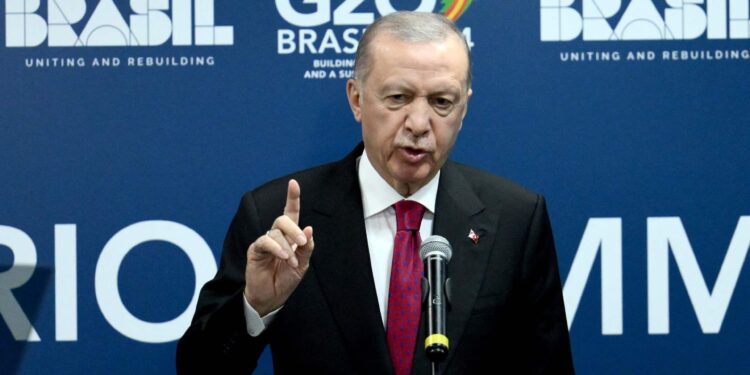Turkish President Recep Tayyip Erdogan confirmed that minimum wage increases will continue to outpace inflation rates through 2025.
This came in a statement made by Erdogan after his return from the G20 summit in Brazil, justifying the matter by saying that it aims to protect the purchasing power of workers in light of continuing inflationary pressures, according to a report issued by Bloomberg.
This comes as the government prepares to begin negotiations on increases next December, with Erdogan retaining the final decision.
According to the Bloomberg report, wage increases are one of the decisive factors that determine inflation next year, and investors are hoping for “studied” increases that are in line with the Central Bank’s expectations that indicate a decline in inflation to 21% by the end of 2025.
The minimum wage rose in 2023 by a significant 107%, exceeding the annual inflation rate of 65% at that time.
In 2024, wages increased by 49%, which exceeds the Central Bank’s inflation expectations of 5%, according to Erdogan’s statements.
Expectations and strategies for 2025
Erdogan stressed that the government will adopt a similar approach for next year, and will work to “protect the purchasing power of the working class,” noting that Turkey’s goal is to reduce inflation to single digits, which will enhance living standards, according to what the agency reported.
The current net minimum monthly wage is 17,000 Turkish liras ($493), which is a main reference for salary agreements in the country, as it constitutes more than a third of the country’s workforce.
Market reaction
Analysts at Deutsche Bank told the agency that investors prefer increases in the minimum wage of about 25%, to maintain control of inflation, and they warned that increases exceeding 30% may cause concern in the markets.
As for Morgan Stanley, it expects inflation to reach 44.5% by the end of 2024 and to decline to 26% in 2025 based on an expected 30% increase in wages.
Bloomberg reported last month that a group of economists called on the government to link wage increases to actual inflation rather than expectations, and they considered that this would better reflect the needs of workers.
Although inflation has declined from its peak of 75.5% earlier this year to 48.6% last October, the cost of living still poses a major challenge for Turkish families.



